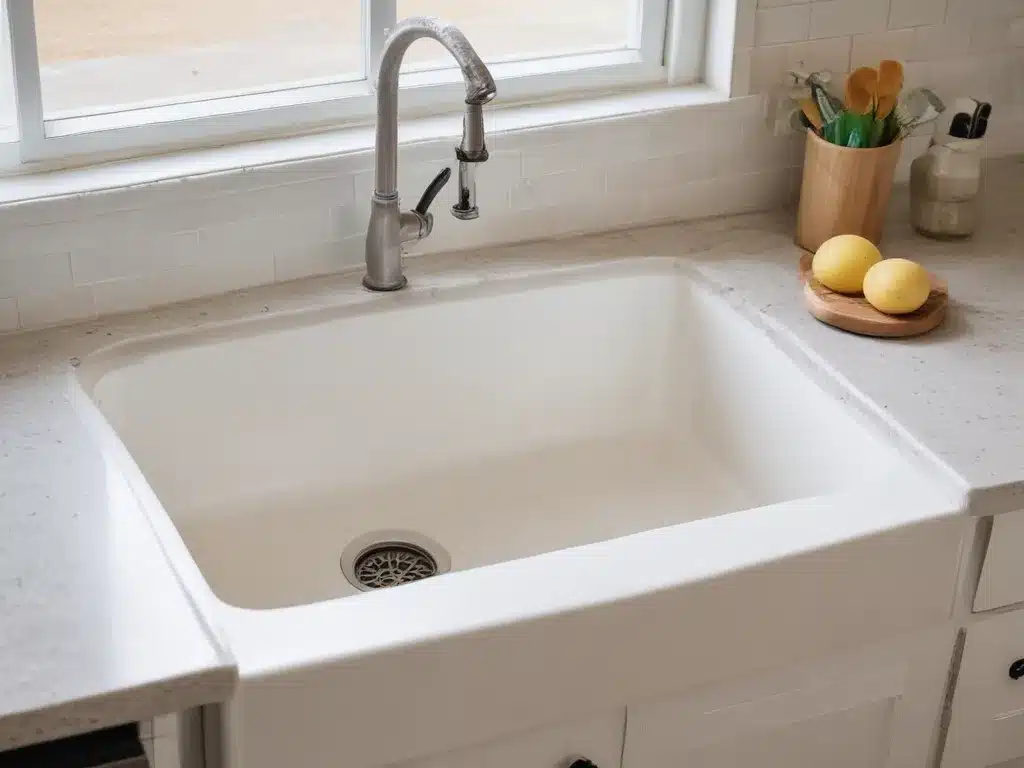Introduction
As a health-conscious individual, I understand the importance of maintaining a clean and hygienic kitchen environment. The kitchen sink, in particular, is a breeding ground for bacteria and grime, which can pose serious risks to our well-being. However, many commercially available cleaning products contain harsh chemicals that can be harmful to our health and the environment.
In this comprehensive guide, I will share effective and eco-friendly strategies for cleaning your kitchen sink without relying on harsh chemicals. By following these methods, you can ensure a spotless sink while protecting yourself, your family, and the planet.
Natural Cleaning Solutions
One of the most eco-friendly and cost-effective ways to clean your kitchen sink is by using natural ingredients that you may already have in your pantry. These natural cleaning solutions are gentle yet powerful, and they can tackle even the toughest stains and buildup.
Baking Soda and Vinegar
The combination of baking soda and vinegar creates a fizzing reaction that can effectively remove stubborn stains and grime from your kitchen sink. Here’s how to use it:
- Sprinkle a generous amount of baking soda over the sink surface.
- Pour vinegar over the baking soda, ensuring it covers the entire area.
- Allow the mixture to fizz and react for a few minutes.
- Use a scrub brush or sponge to scrub the sink, focusing on the stained or grimy areas.
- Rinse the sink thoroughly with hot water to remove any remaining residue.
Lemon Juice
Lemon juice is a natural disinfectant and deodorizer, making it an excellent choice for cleaning your kitchen sink. Its acidic properties help cut through grease and grime, leaving your sink shining and smelling fresh.
- Squeeze the juice of one or two lemons into a bowl.
- Sprinkle some salt over the lemon juice, creating a paste-like consistency.
- Use the lemon-salt paste to scrub the sink, paying extra attention to stubborn stains and buildup.
- Rinse the sink with hot water to remove any remaining residue.
Castile Soap
Castile soap is a gentle, plant-based cleanser that can effectively clean your kitchen sink without harsh chemicals. Its natural ingredients make it safe for use around food preparation areas and for those with sensitive skin.
- Mix a small amount of castile soap with warm water in a spray bottle.
- Spray the solution onto the sink surface and let it sit for a few minutes.
- Use a sponge or cloth to wipe down the sink, ensuring you cover all areas.
- Rinse the sink thoroughly with hot water to remove any soap residue.
Scrubbing Techniques
While natural cleaning solutions are effective, proper scrubbing techniques are equally important for achieving a spotless sink. Here are some tips to keep in mind:
- Use a gentle scrub brush: Invest in a high-quality scrub brush with soft bristles to avoid scratching the sink surface.
- Utilize baking soda as an abrasive: Baking soda is a mild abrasive that can help remove stubborn stains and buildup without damaging the sink material.
- Scrub in circular motions: Scrub the sink in circular motions, applying gentle pressure to ensure thorough cleaning.
- Pay attention to corners and crevices: Don’t forget to clean the corners and crevices of your sink, as these areas can harbor dirt and grime.
Maintenance and Prevention
To keep your kitchen sink clean and bacteria-free, it’s essential to practice regular maintenance and preventive measures. Here are some tips to help you:
- Rinse the sink after use: Make it a habit to rinse your sink with hot water after each use to prevent food particles and residue from accumulating.
- Dry the sink thoroughly: Moisture can encourage the growth of bacteria and mold, so be sure to dry your sink with a clean towel or cloth after rinsing.
- Disinfect regularly: Use a natural disinfectant, such as vinegar or hydrogen peroxide, to sanitize your sink once a week or as needed.
- Avoid pouring grease down the drain: Grease and oil can clog your pipes and lead to a smelly, dirty sink. Instead, dispose of them properly in a designated container.
- Clean the drain: Regularly clean your sink drain to prevent buildup and odors. You can use a drain snake or a mixture of baking soda and vinegar to keep it clear.
Conclusion
By following these natural and eco-friendly methods, you can maintain a clean and hygienic kitchen sink without relying on harsh chemicals. Not only will this approach protect your health and the environment, but it will also save you money in the long run.
Remember, regular maintenance and preventive measures are key to keeping your sink sparkling clean. Embrace these sustainable cleaning practices, and enjoy a fresh, inviting kitchen space that promotes well-being for you and your loved ones.







